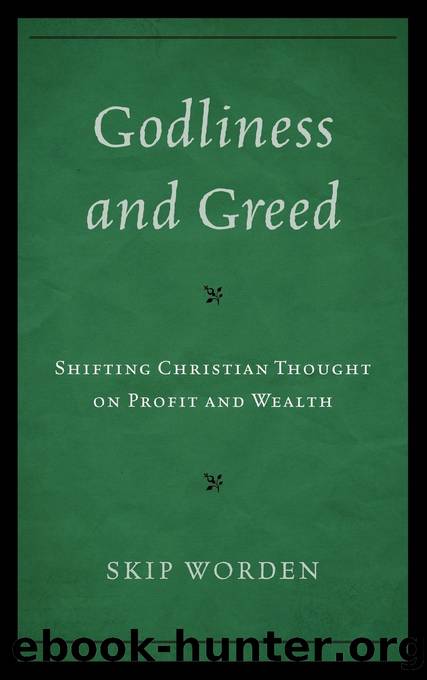Godliness and Greed by Worden Skip;

Author:Worden, Skip;
Language: eng
Format: epub
Publisher: Lexington Books
Published: 2010-08-15T00:00:00+00:00
We cannot even ascribe our own effort to ourselves.
Accordingly, Calvin does not allow for the efficacy of human effort in procuring oneâs salvation. God chooses certain souls as his elect. Such souls are predestined to salvation from eternity by âhis freely given mercy, without regard to human worthâ; the remainder is consigned to eternal damnation âby his just and irreprehensible but incomprehensible judgment.â50 Calvin writes, âScripture . . . teaches that we are not to consider that men merit of themselves but to look upon the image of God in all men, to which we owe all honor and love.â51 Therefore, we err if we think we enrich ourselves by our own merit.52 In this regard, Calvin is in lock-step with Augustineâs later writings. In Calvin as well as his successors, we can distinguish human activity in the form of good works as a response to Godâs grace from efficacy in gaining salvation. Tawney points out that in Calvinism, âGood works are not a way of attaining salvation.â53 Rather, they go right along with how the elect would be likely to respond to Godâs glory in their lives. âHuman effort, social institutions, the world of culture,â Tawney argues, are for Calvin (and succeeding Calvinists) âat best irrelevant to salvation, and at worst mischievous.â54 This is to say: there is nothing we can do to gain salvation, and thus worldly economic success plays no role in securing oneâs salvation.
A humanâs external actions, including success in terms of wealth, can at best be viewed only be a responseâcertainly not a contributory factor.55 This means that financial success does not reflect on our deserving of salvation. Calvin observes, âriches come not at all to men through their own virtue, nor wisdom, nor toil, but only by the blessing of God.â56 Harkness concludes that for Calvin, âGod dispenses riches and poverty as he will.â57 Neither is wealth proof of having been saved, nor can even the right sort of external activity be counted as proof of election.
Tawney claims that for Calvin, âgood works . . . are indispensable as a proof that salvation has been attained.â58 Fullerton places the âproofâ from demonstrated moral discipline above oneâs Beruf. âWithin the sphere of this life lies oneâs calling (so Luther), but calling now becomes the means of moral discipline (so Calvin); the Calvinist practiced self-discipline for the glory of God, and in the practice of it assurance came.â59 Fullerton argues that the Calvinist conception of âcallingâ itself can be viewed as being the life of strict discipline lived in the secular sphereâwith the sole intent of glorifying God; however, the special contribution of Calvinism is here again the âblessed sense of assurance of election as its reward.â60 While these âproofâ statements can refer to Calvinâs successors, they cannot characterize Calvinâs position, given the ontological and epistemological distance that he posits in his post-lapsarianism between Creator and Creation.
According to Calvin, an epistemological distance of understanding must lie between Godâs mind and our neurons. This gulf manifests, for example, in a human beingâs capacity as creature to construe his Creatorâs will.
Download
This site does not store any files on its server. We only index and link to content provided by other sites. Please contact the content providers to delete copyright contents if any and email us, we'll remove relevant links or contents immediately.
The Vikings: Conquering England, France, and Ireland by Wernick Robert(80123)
Ali Pasha, Lion of Ioannina by Eugenia Russell & Eugenia Russell(40226)
The Conquerors (The Winning of America Series Book 3) by Eckert Allan W(37375)
The Vikings: Discoverers of a New World by Wernick Robert(36959)
Cecilia; Or, Memoirs of an Heiress — Volume 1 by Fanny Burney(32527)
Cecilia; Or, Memoirs of an Heiress — Volume 2 by Fanny Burney(31929)
Cecilia; Or, Memoirs of an Heiress — Volume 3 by Fanny Burney(31916)
Empire of the Sikhs by Patwant Singh(23062)
The Secret History by Donna Tartt(19003)
Hans Sturm: A Soldier's Odyssey on the Eastern Front by Gordon Williamson(18556)
Cat's cradle by Kurt Vonnegut(15307)
Pimp by Iceberg Slim(14466)
Sapiens: A Brief History of Humankind by Yuval Noah Harari(14346)
Talking to Strangers by Malcolm Gladwell(13332)
Norse Mythology by Gaiman Neil(13318)
Leonardo da Vinci by Walter Isaacson(13292)
4 3 2 1: A Novel by Paul Auster(12354)
Underground: A Human History of the Worlds Beneath Our Feet by Will Hunt(12073)
The Radium Girls by Kate Moore(12003)
